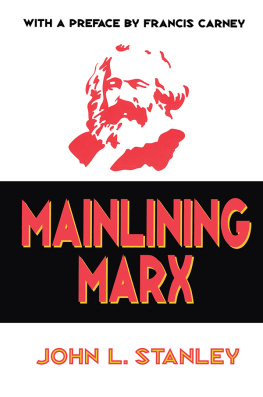Richard Schmitt - Introduction to Marx and Engels: A Critical Reconstruction
Here you can read online Richard Schmitt - Introduction to Marx and Engels: A Critical Reconstruction full text of the book (entire story) in english for free. Download pdf and epub, get meaning, cover and reviews about this ebook. year: 1987, publisher: Westview Press, genre: Politics. Description of the work, (preface) as well as reviews are available. Best literature library LitArk.com created for fans of good reading and offers a wide selection of genres:
Romance novel
Science fiction
Adventure
Detective
Science
History
Home and family
Prose
Art
Politics
Computer
Non-fiction
Religion
Business
Children
Humor
Choose a favorite category and find really read worthwhile books. Enjoy immersion in the world of imagination, feel the emotions of the characters or learn something new for yourself, make an fascinating discovery.
- Book:Introduction to Marx and Engels: A Critical Reconstruction
- Author:
- Publisher:Westview Press
- Genre:
- Year:1987
- Rating:3 / 5
- Favourites:Add to favourites
- Your mark:
Introduction to Marx and Engels: A Critical Reconstruction: summary, description and annotation
We offer to read an annotation, description, summary or preface (depends on what the author of the book "Introduction to Marx and Engels: A Critical Reconstruction" wrote himself). If you haven't found the necessary information about the book — write in the comments, we will try to find it.
This book steers a middle path between those who argue that the theories of Marx and Engels have been rendered obsolete by historical events and those who reply that these theories emerge untouched from the political changes of the last ten years.
Marxism has been a theory of historical change that claimed to be able to predict with considerable accuracy how existing institutions were going to change. Marxism has also been a political program designed to show how these inevitable changes could be hastened. Richard Schmitt argues that Marxian predictions are ambiguous and unreliable, adding that the political program is vitiated by serious ambiguities in the conceptions of class and of political and social transformations. Marxism remains of importance, however, because it is the major source of criticisms of capitalism and its associated social and political institutions. We must understand such criticisms if we are to understand our own world and live in it effectively. While very critical of the failures of Marx and Engels, this book offers a sympathetic account of their criticism of capitalism and their visions of a better world, mentions some interpretive controversies, and connects the questions raised by Marx and Engels to contemporary disputes to show continuity between social thought in the middle of the last century and today.
Addressed to undergraduate students, the book is easily accessible. It will be important in introductory or middle-level courses in sociology, political theory, critical theory of literature or law. It will also be useful in graduate courses in political theory, sociology, and economics.
Richard Schmitt is Professor Emeritus of Philosophy at Brown University. He now teaches at Assumption, Becker and Worcester State Colleges as an adjunct. Born in Germany, of Jewish parentage, he arrived in the United States in 1946. Best known for his introductory texts to Heidegger and to Marx and Engels, he has written widely about existentialism and political philosophy. Alienationa topic at the intersection of Existentialism and Political Philosophyhas been a lifelong concern of his.
Richard Schmitt: author's other books
Who wrote Introduction to Marx and Engels: A Critical Reconstruction? Find out the surname, the name of the author of the book and a list of all author's works by series.












